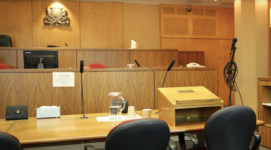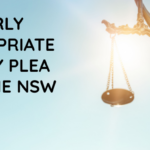Pleading Guilty in the NSW Local Court: Preparation, Practice and Procedure

Tottenham Hotspur Football Club owner Joe Lewis pleaded guilty to the white collar crime of insider trading on 24 January 2024, as the UK billionaire admitted to a United States court that he’d been informing associates about company information not available to the public for the latter to profit from it.
In pleading guilty to two counts of securities fraud and one of conspiracy to commit that same offence, Lewis admitted that he’d passed on his privileged knowledge regarding his portfolio of companies to private pilots, personal assistants and romantic partners who made millions.
Mr Lewis is set to be sentenced on 28 March 2024, which will allow both him and his criminal defence lawyers time to organise and review subjective materials and submissions to the court, which will serve to inform the judge during the sentencing proceedings.
Having pleaded guilty, Mr Lewis will be entitled to what is known as a discount on sentencing and will avoid the additional delay, stress, uncertainty and indeed cost of a defended hearing or jury trial.
Lawyers advise, but the decision on how to plead is the client’s
Part of the role of a criminal defence lawyer is to assist the case, advise the client of the strengths and weaknesses in the evidence, any available defences and what the lawyer considers to be the optimal path forward.
However, it is ultimately for the client to decide as whether to plead guilty or not guilty.
If the client wishes to plead guilty, a good defence lawyer will then undertake a number of important tasks, which may include seeking to downgrade or reduce the number of charges, negotiating the agreed ‘facts’ with a view to reducing the seriousness of the allegations, referring the client to appropriate professional/s to undertake courses, counselling and/or treatment and obtaining a report, guiding on the preparation of various materials such as a letter of apology to the court and character references, preparing submissions to be made in court, and so on.
Mr Lewis, who has a net worth of AU$5.856 billion, presumably engaged experienced, specialist criminal lawyers to represent him, who would have carefully considered and diligently worked on the case before advising their client to plead guilty, and will certainly have commenced preparations for the sentencing hearing.
Assessing the case before making a plea decision
A defendant can plead guilty at any time from point from the first court date until both the prosecution and defence having finished putting their cases to the court, during a defended hearing or jury trial.
However, it’s always good to contemplate the options available prior to jumping at the choice of admitting guilt, and an experienced criminal defence lawyer will be able to assist by assessing the case, determining whether the correct charge/s have been brought, evaluating the strength of the evidence, advising the client of his or her options and the best way forward, and working towards the best possible outcome in the circumstances.
Do not plead guilty by way of a written notice of pleading
On charging, officers may present an arrestee with a yellow form specifying the charged offence.
This form will also contain a section known as a written notice of pleading, which can be filled out specifying a guilty plea and briefly setting out mitigating factors, which are matters that can lessen the assessed seriousness of the offence and severity of penalty. But taking this route means the ability to fully put mitigating factors before the court is not available to the fullest.
It also can suggest the defendant is not taking the matter as seriously as he or she should and, importantly, prevents the court from imposing a non-conviction with a good behaviour bond, such as a conditional release order without conviction.
Obtain the formal, typed court attendance notice
For these and other reasons, the best option at this point is to obtain, or better yet have your lawyer obtain, a copy of the official Defendant Court Attendance Notice (CAN) from the police. This will include the details of the criminal offence and the specifics of the actual incident according to NSW police, which is known as the Facts Sheet.
Having a lawyer assess that document in the context of a client’s instructions and any other available information is crucial.
Representations to the prosecution
If the details contained in the Facts Sheet are not fully agreed, a lawyer can write representations to the police, which can result in parts of the ‘facts’ being amended.
Representations can also be made to have charges downgraded or withdrawn, or the proceedings discontinued altogether.
However, submitting representations can mean the case is not finalised on the first court date, as they can take six weeks or more for the prosecution to consider and determine.
Subjective materials
In the event a decision is made to plead guilty, it is important to ensure a number of materials are gathered before the sentencing date, to be handed up to the presiding judicial officer on that day.
This rule holds true whether a person is represented by a lawyer or plans to represent themselves in court.
An apology letter addressed to the magistrate or judge is one key document and the other is up to three character references. And while it may appear such documents are mere formalities, this is hardly the case as they can lead to more lenient penalties.
Character references are statements from someone who knows the defendant personally and can provide details of their relationship, the defendant’s background in terms of prior good character and any knowledge they may have about remorse shown by the defendant outside of court.
In terms of an apology letter, the defendant should express their request in regard to having committed the offence, outline an understanding of how their behaviour may have impacted any third parties and to apologise for inconveniencing the court.
Other materials that can be helpful are those capable of persuading the court that any underlying issues have been or are being addressed, and that the defendant is therefore less likely to reoffend.
Examples of such materials are counselling reports, traffic offender program reports (for those pleading guilty to major traffic offences such as drink driving), reports from the Smart Recovery Program or Magistrates’ Early Referral Into Treatment, or MERIT, program (for those pleading guilty to drug offences), reports following the completion of an anger management program (for offences involving violences such as assaults and domestic violence offences), and so on.
Will my case be finalised in the Local Court or be referred to a higher court.
A defendant first appears in a Local Court for an administrative court date known as a mention, regardless of the seriousness or triviality of the charges they are facing.
If he or she pleads guilty on that or later court date to a less serious charges, known as a summary offence (which typically carry a maximum penalty of two years or less in prison), the magistrate can proceed to sentencing on that day.
Alternatively the magistrate may adjourn the case to another date for sentencing. This may occur in order to obtain a report about the defendant known as a sentencing assessment report (previously known as a pre-sentence report) and/or to allow him or her to complete a program or obtain other materials.
Those who wish to plead guilty to more serious offences, known as indictable offences, will be referred to a higher court for sentencing in the event the prosecution ‘elects’ (chooses) to have them committed to such a court.
Strictly indictable offences are the most serious in the law books, and must be referred to a higher court – neither the prosecution or defence have any say in this.
If a person pleads guilty in a NSW court, they’re then eligible to a sentencing discount due to the utilitarian value of their plea, which means the action of pleading guilty benefits society as it requires less court resources and it further shows the defendant is taking responsibility for their actions.
Since 2018, the Early Appropriate Guilty Plea (EAGP) scheme has operated in New South Wales, which applies to indictable cases, which are those capable of being referred to a higher court such as the District or Supreme Court. Under the scheme, a defendant is entitled to a 25% discount on sentencing if a plea of guilty is entered at the Local Court stage.
If a defendant pleads guilty in the higher court at least 14 days before the first listed trial date, the discount is 10 percent discount, and drops to 5 percent thereafter.
Inside the Local Court
On the day of sentencing in a New South Wales Local Court, three copies of all sentencing materials should be on hand, and one of those copies should be given to the prosecutor before the matter comes before the magistrate.
A lawyer can mention their client’s matter and inform the court it is ready for the sentencing hearing. Alternatively, a defendant can wait until their case is called, and then inform the court of the same.
The documents will then be handed up to the magistrate who will all of these and, of course, the Court Attendance Notice containing the Facts Sheet.
The defendant, or lawyer on his or her behalf, will then make verbal submissions to the court, explaining the circumstances surrounding the incident and emphasising matters that lessen its seriousness, including those which evidence remorse and the unlikelihood of reoffending. This is a critical phase of the sentencing process and it is crucial the submissions are put to the magistrate clearly, succinctly and persuasively.
The prosecutor will then have an opportunity to put the position on behalf of the state.
After hearing all of those submissions, the magistrate will then deliver the outcome which, hopefully, will be a lenient one like a non-conviction order such as a section 10 dismissal or a conditional release order without a criminal conviction.
Going to court?
As Joe Lewis’ appearance in court this week reveals, it doesn’t matter how much money one has to spend on legal fees, sometimes pleading guilty is the best path.
However, in order to be sure that you are making the right choice the advice of an experienced, specialist criminal defence lawyer is a necessity.
If you are facing court, call Australia’s most awarded criminal law firm, Sydney Criminal Lawyers, anytime on (02) 9261 8881 and let our vastly-experienced, profession-leading, specialist criminal defence team assess your case, advise you of your options and the best way forward, and fight for the optimal outcome.






